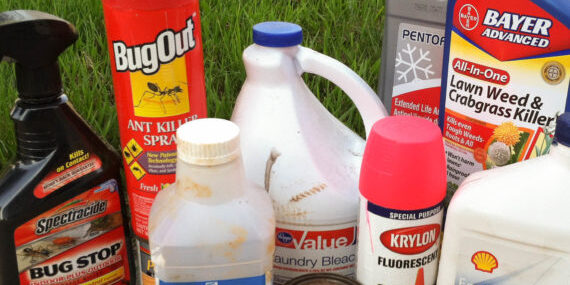At one time or another, most of us have purchased hazardous items, chemicals or cleaning agents, which can be harmful to our environment, people and animals. When using these products, take care to follow instructions for their use, and learn about safe disposal methods to prevent accidents or contamination to the environment.
Household Cleaners
Many strong household cleaners can be dangerous to the environment when improperly disposed of. Take leftover products like drain and oven cleaners, to a nearby hazardous drop-off site.
Garden & Lawn Chemicals
Dispose of weed killers, mice poisons, bug killers, herbicides and pesticides at your county drop-off site for hazardous wastes.
Automotive Products
Fluids and fuel used in automotive products can be explosive, flammable and toxic. Safely dispose of them at a hazardous waste site.
Products for Personal Care
Read the labels to determine the best way to get rid of personal care items like hairspray, nail polish and removers, which can be flammable.
Products Used for Painting
Many products used in the painting process are considered to be hazardous and should not be tossed into the garbage or down the sink drain. Gather your leftover painting supplies like solvents, paint thinners, oil-based paint and latex paint, and dispose of them at a hazardous waste site, which accepts household waste.
Aerosol Cans
Most trash collectors won’t accept trash containing aerosol cans, which can easily explode when punctured or heated. It’s easy to collect all your hazardous waste materials together and make one trip to the waste disposal site.
Light Bulbs
Any light bulbs containing mercury like High-intensity discharge or fluorescent bulbs need to be brought in to be recycled. Hazardous waste sites accept them or many retailers like Ace Hardware, Lowes and Home Depot will recycle them for you.
Products Containing Mercury
Any products containing mercury cannot be thrown in garbage cans for collection. Take mirrors, recreational equipment, games, antique toys, thermostats and thermometers containing mercury to a hazardous collection waste site.
Batteries
Batteries should not be thrown away in the home garbage or landfills. Instead, check with county services to find a nearby disposal site for recycling.
Before making store purchases, read labels with warnings, and consider purchasing other products, which are less hazardous to humans, pets and our environment.







